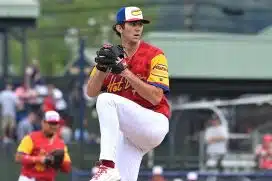By Tim Kelly, Sports Talk Philly editor
During Spring Training 2016, an outlet from the Dominican Republic reported that the Philadelphia Phillies had offered third baseman Maikel Franco a six-year/$39 million extension. Understandably, Franco and his representatives weren’t in a rush to sign what would have amounted to an extremely team friendly contract, but the Phillies were correct in trying to buy out Franco’s remaining years of team control.
In fact, the Phillies would be wise to revisit those talks with Franco’s representatives this offseason, assuming they are ready to come back with a more realistic offer.
After Charlie Manuel suggested in Spring Training that he believed Franco could hit 30 home runs and drive in over 100 RBIs in 2016, Franco had a disappointing 2016 campaign. Still, the 24-year-old hit 25 home runs and drove in 88 runs, with next to nothing around him in the lineup. He hit 25 home runs and drove in 88 runs while almost always trying to pull the ball, something that new hitting coach Matt Stairs likely plays to fix. And as mentioned, he’s only 24.
Franco isn’t peak Ryan Howard, but Howard is a good example as to why the Phillies may be smart to buy out the remaining years of Franco’s team control. After his MVP season of 2006, the Phillies stiffed Howard because he wasn’t yet arbitration eligible and gave him a $900,000 salary months after he hit nearly 60 home runs. Prior to the 2008 season, he won his arbitration case over the Phillies, which allowed him to earn a $10 million salary in 2008, which was the highest amount any player had won in arbitration history at that point. At that point, the Phillies would have been smart to attempt to sign Howard for his three remaining seasons of team control, where an offer of something like $14 million per season may have saved the Phillies some future money. Instead, the Phillies allowed Howard to hit 48 home runs and win a World Series in 2008, which forced their hand into giving him a three-year/$54 million deal ($18 million per year) before 2009.
Nearly a decade later, the Phillies may be in a similar situation with Franco. He’s not going to hit 58 home runs, but he may hit 30 or 35 fairly soon. He may drive in 100 runs next year. And he’s a serviceable enough fielder — especially with the possibility of him moving to first base at first still lingering — to make a ton of money off of his power if he learns how to hit the ball to all fields.
Franco is under team control for one more season and then has four potential years of arbitration before he’s eligible for free-agency. General manager Matt Klentak and the Phillies would be wise to offer Franco something in the range of $13-$15 million per season for the next five seasons, which would be his remaining years before he could hit free-agency.
In the short term, the Phillies would by paying Franco much more than they would by just taking things year-to-year. But they can afford to do that, because they have more than enough money to spend now and no money on the books after 2018. And after 2018, when the Phillies hope to be big spenders in what may be the greatest free-agent class ever, the Phillies would probably be leaving themselves with more money to spend by taking care of Franco now.
Let’s assume Franco becomes a 30-35 home run per season hitter, that regularly drive in 100 runs a year over the next few seasons. If you factor in the inflation that the game has seen over the past decade, mixed with the insane contracts that are going to be handed out after 2018, paying Franco $14 million a year may turn out to be a bargain. He may not even have to fulfill all of his potential for it to be. At worst, the Phillies would end up paying Franco about what he would have make through arbitration or a later extension.
Could the Phillies afford to wait on Franco, with the understanding that while he may end up costing closer to $20 million per season at the end of his arbitration years that he may never fulfill his potential? Sure. But it may cost them a chance to sign a J.C. Romero type set-up man when they are a playoff contender. An extra few million a year could push them against (or over) the luxury tax threshold, which may discourage them from trading for or signing a piece that could put them over the top at the end of this decade.
From Franco’s perspective, his representatives may not be interested in giving away the rest of his years under team control. Perhaps they would be willing to sign a deal to take care of the next two seasons, but then the Phillies lose their incentive to pay Franco more money up front because they wouldn’t be potentially saving more money in the long-run.
It still makes sense for the Phillies to engage in talks with Franco’s representatives, though. Last year’s reported offer amounted to an attempt to swindle Franco, but a real offer now could potentially be of interest to both sides as the Phillies should be beginning to try to lock up some of their young talent before they become more expensive.







